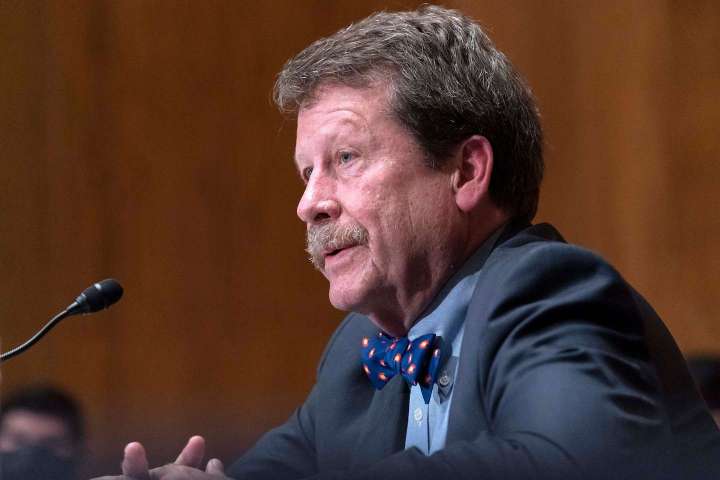The commissioner of the Food and Drug Administration said Wednesday that the agency is preparing for a shake-up of its food-safety program, four months after a nationwide shortage of baby formula drew attention to shortcomings in the program.
FDA announces overhaul as baby formula shortage continues

“We have to look at the whole picture: It’s the structure, it’s the function, it’s the leadership. We are doing a top-to-bottom evaluation. It’s hard to pick out one or two things, it’s a multidimensional industry,” Califf said Wednesday during a hearing of the Senate Appropriations agriculture subcommittee. “There’s consensus that whatever was done in the past was not successful.”
Critics have long complained that the FDA prioritizes drugs and medicine over food safety, despite a steady stream of high-profile outbreaks of food-borne illnesses in recent years, including romaine lettuce tainted with e-coli and salmonella in peanut butter. The Centers for Disease Control and Prevention estimates that 128,000 people in the United States are hospitalized with food-borne illnesses each year.
The concern reached new heights after several babies were sickened or died after drinking formula produced at an Abbott Nutrition plant in Sturgis, Mich., last year. Although the illnesses could not be traced to the plant, and the company said that bacteria tied to the illnesses did not originate there, the factory was closed for months after the FDA cited unsanitary conditions there.
The closure led to a nationwide formula shortage, which continues even though the plant reopened in June. The latest in-stock figure for baby formula powder was 70 percent for the week ending July 3, down from 77 percent in the week ending June 5, according to data from IRI Worldwide, a market research company. The shortage also raised questions about why FDA did not act sooner on a whistleblower complaint about conditions at the Abbott plant.
At the hearing Wednesday, Sarah Gallo, the vice president for product policy at the Consumer Brands Association, a grocery store industry group, urged the FDA immediately to unify its food programs under a single head. Her recommendation echoed that of consumer groups, which for months have been calling for a single “food czar” within the agency. This appointee would have direct line authority over the Center for Food Safety and Applied Nutrition, the Center for Veterinary Medicine and the food-related components and operations of the Office of Regulatory Affairs.
“The lack of a single, full-time, fully empowered, expert leader affects all aspects of the FDA’s food program,” Gallo said. “Inefficient decision-making has slowed reviews, hindering progress and even rendering innovation obsolete. Inexperienced and undertrained inspectors are being sent into the field. A split and siloed food program undercuts communication and collaboration at the expense of efficiency and responsiveness.”
Beyond unifying the food program leadership, Gallo called on FDA to convene an independent panel of experts to address modernizing inspections, labeling and recall processes, addressing e-commerce, and emerging technology and new models for collaboration with industry.
Califf said the agency was underfunded and suffers from high staff turnover.
“My assessment is [the agency] is staffed by highly dedicated people, but they are working in a suboptimal environment that needs to be reformed, including the structure, function, leadership and funding,” Califf said. “Several key issues must be addressed. Hiring and retaining food-safety staff has long been a concern.”
Not all of the senators were convinced that additional funding was the clear answer to the agency’s woes.
In the past decade, the agency’s budget has increased 37 percent, said Sen. John Hoeven (R-N.D.). “We’ve provided the FDA with a lot of budget flexibility.”






